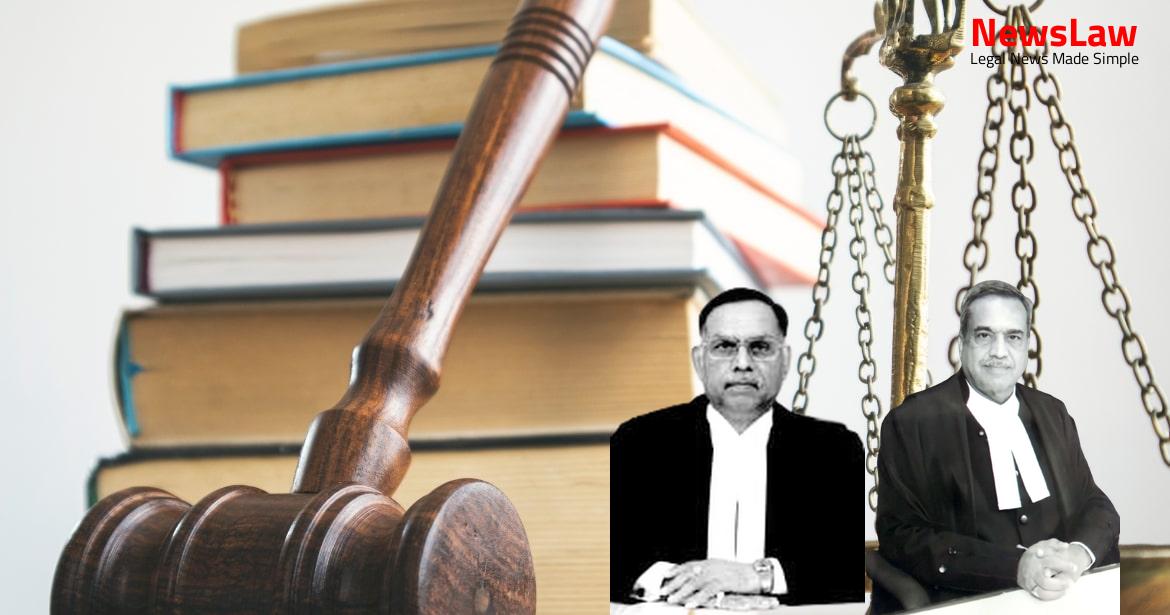Delve into a summary of a legal case focusing on the court’s analysis of the impact of acquittal in a criminal case on eligibility for government service. This case delves into the importance of understanding legal principles and court judgments in determining individuals’ suitability for specific roles within the government sector. The court’s careful examination of the law and its application in this case sheds light on the complexities of legal proceedings in such matters.
Facts
- The appellant submitted an online application form in pursuance of an advertisement.
- A provisional select and waiting list was published, including the appellant’s name at Serial No. 13 in the unreserved category.
- The Government issued a Gazette notification deleting the appellant’s name from the main select list.
- The appellant filed a Writ Petition challenging the order and Gazette notification.
- The Medical Board requested health tests from the appellant.
- The appellant was informed of being selected for the post of District Judge.
- The Principal Secretary declared the appellant ineligible for the post due to a criminal case against him.
- The appellant was acquitted of the charges framed against him in the criminal case.
- An application was filed to amend the writ petition to include the acquittal order and subsequent events.
- Appellant filed a writ petition to quash orders holding him unsuitable for the post of District Judge.
- Orders dated 14.09.2018, 18.07.2018, and 21.09.2019 were challenged.
- The Division Bench of the High Court of Madhya Pradesh dismissed the writ petition.
Also Read: Transfer of Writ Petitions for Chartered Accountants’ Tax Audit Guidelines
Arguments
- The appellant’s candidature could not have been cancelled solely based on the pendency of a criminal case as per the judgement in Mohammed Imran vs State of Maharashtra.
- Referring to the case Joginder Singh vs Union Territory of Chandigarh, it was highlighted that an acquittal before the interview/medical examination did not entitle the appellant for reconsideration for appointment.
- The appellant had disclosed the lodging of FIR against him in the online application form.
- After being acquitted on 18.09.2019, the High Court was supposed to reconsider the appellant’s case for appointment, but failed to do so.
- No other material on record indicated any misconduct or inadequacy in the appellant’s antecedents.
- The petitioner argues that the decision declaring him unsuitable due to a pending criminal case under Section 498A, 406 IPC goes against the guidelines set by the Government of Madhya Pradesh for character verification.
- He points out that according to paragraph 6(viii) of the guidelines, if a candidate is acquitted on merit by the Court, they should be considered eligible for Government service.
- The petitioner claims that this clause in the Government Order was not followed in his case, leading to his unsuitability being declared.
Also Read: Analyzing Interference with Acquittal in Legal Conviction Case
Analysis
- The appellant’s acquittal in the criminal case was after the character verification and rejection of his candidature.
- The acquittal must completely exonerate the individual to be considered for government service.
- The Screening Committee’s decision is final unless proven mala fide.
- The acquittal order must be examined to determine complete exoneration.
- The appellant’s inclusion in the select list was based on being acquitted on merits by the Court.
- The appellant’s name was deleted from the select list due to a pending criminal case, not concealment of information.
- The mere subsequent acquittal after rejection cannot reverse the earlier decision.
- The potential stigma attached due to the criminal case is negated by the acquittal.
- The decision to declare the appellant unsuitable was based on the pending criminal case, within the Committee’s jurisdiction.
- Arbitrary decisions of the Selection Committee can be reviewed by Constitutional Courts if found unjust.
- The decision of the Screening Committee must be considered final unless shown to be mala fide.
- Acquittal in a criminal case does not automatically entitle a candidate to appointment.
- Candidates wishing to join the police force must have impeccable character and integrity.
- Even if acquitted, a person with criminal antecedents may not be suitable for certain positions.
- Employers have the discretion to consider antecedents and determine suitability for appointment.
- Non-disclosure or submission of false information may be grounds for cancellation of candidature or termination of services.
- Integrity and high standards of conduct are crucial in the police force, as it holds great responsibility in society.
- Stigma of the criminal case against the appellant under Section 498A/406/34 IPC is washed out due to the appellant’s acquittal on 18.09.2019.
- High Court’s dismissal of the writ petition was deemed error-free in light of the above.
Also Read: Judicial Review on Sentence and Compensation in Criminal Case
Decision
- The appellant’s writ petition did not entitle them to any relief.
Case Title: ANIL BHARDWAJ Vs. THE HONBLE HIGH COURT OF MADHYA PRADESH (2020 INSC 591)
Case Number: C.A. No.-003419-003419 / 2020



